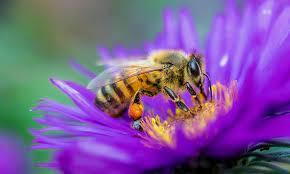Insect Bites!

- posted: Jun. 06, 2022
We all dread it...seeing Fido come in from outside and he is pawing at his face or suddenly has puffy, red eyelids. These can be some of the early signs you may notice in your pet if they have received an insect bite. Most commonly we will see bites from bees or wasps, however other insects such as spiders, ants and beetles can cause similar allergic reactions.
If you can see the stinger at the bite, you can attempt to remove it with tweezers; however if it is not readily visible it is not advised to squeeze or poke the sting site in an effort to find it. You can apply a cool damp cloth to the bite area to soothe the inflammation and decrease irritation.
Insect bites can sometimes trigger a more systemic allergic reaction where pets may develop swelling of the face (most commonly around the upper eyelids, bridge of the nose or jowels). Pets may also develop all-over body itchiness or hives, as well as difficulty breathing and general agitation. If any of these more severe symptoms are noted, your pet should be seen by a veterinarian immediately for assessment and further treatment which often will include antihistamine and/or steroid medications and sometimes hospitalization.

- posted: Jun. 06, 2022
We all dread it...seeing Fido come in from outside and he is pawing at his face or suddenly has puffy, red eyelids. These can be some of the early signs you may notice in your pet if they have received an insect bite. Most commonly we will see bites from bees or wasps, however other insects such as spiders, ants and beetles can cause similar allergic reactions.
If you can see the stinger at the bite, you can attempt to remove it with tweezers; however if it is not readily visible it is not advised to squeeze or poke the sting site in an effort to find it. You can apply a cool damp cloth to the bite area to soothe the inflammation and decrease irritation.
Insect bites can sometimes trigger a more systemic allergic reaction where pets may develop swelling of the face (most commonly around the upper eyelids, bridge of the nose or jowels). Pets may also develop all-over body itchiness or hives, as well as difficulty breathing and general agitation. If any of these more severe symptoms are noted, your pet should be seen by a veterinarian immediately for assessment and further treatment which often will include antihistamine and/or steroid medications and sometimes hospitalization.
Visit our Office
3259 Eastgate Drive
Regina, Saskatchewan S4Z1A4
